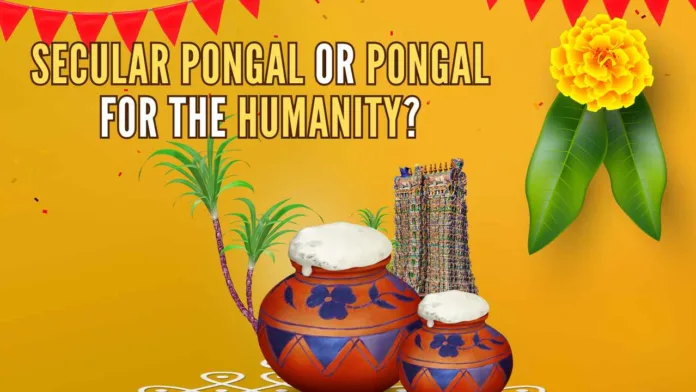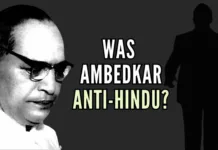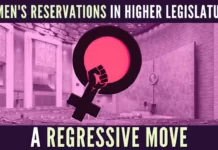
Beauty of Sanatana Dharma
The beauty of Sanatana Dharma, colloquially called Hinduism, is its non-prescriptive nature. Some people take that as a weakness of Dharma, but it isn’t. It is just that we, the people whom Dharma needs to protect, aren’t taking care of Dharma. Remember, “Dharmo Rakshati Rakshitaha”?[1]
While Sanatana Dharma is not prescriptive, it offers you the path. Sanatana Dharma says that compassion is the desire for everyone’s happiness[2]. This call to keep humanity happy is a recurring theme in Sanatana Dharma.
Be it the simple, “Lokah samastah sukhino bhavantu” – Let the entire world be happy
Or the little more elaborate, “Sarve bhavantu sukhinaha, Sarve santu niramaya, Sarve badhrani pashyantu, Maa kaschit dukka baagbavet” – May all things be happy, may all be free of illness, may all see only good things, may none become afflicted with sorrow.
This philosophy of happiness of humanity and care for all can be seen across our customs and practices. Every year, we see pictures and videos of the farmers from the Cauvery Delta welcoming the fresh inflow of the river with reverence – worshipping her with aarti and prostrating to Cauvery. We worship plants, trees, and animals – Tulsi Pooja, Neem tree worship, Go Pooja worshipping the cow, temples dedicated to Nagaraja – the king of snakes. This list can go on. Makara Sankranti, popularly known in Tamil Nadu as Thai Pongal[3], is one such. This pan-Bharata festival has taken the name of what we offer to propitiate humanity, Pongal, prefixed with the name of the month when it is celebrated (the Tamil month of Thai) in Tamil Nadu[4]. In certain parts of Bharata, it is called Tila Sankranti, signifying the harvest of the main crop in those regions, namely, Til or Sesame[5],[6].
What is the significance of Makara Sankranti?
This marks the movement of the Sun into Makara Rasi (Capricorn). In the Indic calendar, this is also the start of the very auspicious Uttarayana[7], when the Sun moves northwards.
This also marks the time of harvesting what was sown four to five months back in the Samba season. In Tamil Nadu, the rice crops sown in July/ August of the previous year are harvested in January, in time for Thai Pongal/ Makara Sankranti.
There is a saying in Tamil, ஆடிப்பட்டம் தேடி விதை (Aadi Pattam Thedi Vidhai). Meaning, wait for the month of Aadi to sow (Aadi corresponds to July/ August in the Gregorian calendar). Aadi is also the month that signals the start of the rainy season and is considered the best time to sow. The rice thus sown in Aadi is ready for harvest in time for Thai (the Tamil month whose first day falls on Makara Sankranti and the day when Thai Pongal is celebrated).
Thai Pongal is an example of the Sanatana Dharma philosophy of keeping humanity happy and expressing gratitude to all beings, including nature’s forces. It is when the farmers worship and thank the Sun, the land, their implements, and the farm animals (bulls and cows). It is also when the rest of the world (the consumers) thanks the farming community and all the other forces that assisted the farmers. This one simple thing would help us conclude that there is nothing secular here.
Therefore, the converse is true, too. That is, Pongal or Makar Sankranti cannot be anything but a celebration of Sanatana Dharma because the Abrahamic religions are monotheistic and don’t allow the worship of anything else but their one god. So, unless this element of worshipping, thanking, and expressing gratitude to nature and humanity is struck off, you cannot endear Thai Pongal to the Abrahamic religions[8].
Makar Sankranti, Uttarayana, Magh Bihu, Maghi, and Thai Pongal are the different names of the same festival celebrated across Bharatavarsha. While there might be elements unique to the different states/ regions (harvest of rice Vs harvest of til or sesame, etc.), the reason and the spirit of the festival are the same.
As the first step, the Dravidian ideologues made Thai Pongal a ‘Tamilar Thirunal’ or a festival unique to the Tamil people, and we people have lapped it up without realizing the mischievous nature of this deed. Knowing very well that their attempts wouldn’t cut ice without sanitizing the Sanatana Dharmic elements of the festival, they co-opted the Islamists, evangelists, and all kinds of Hinduphobes to hasten the process by further creating a new variant of the festival called ‘Samathuva Pongal’ or Secular Pongal[8]. Imagine sanitizing the Christian element from Christmas and making it a ‘Plum cake festival’ or making Bakrid a ‘Mutton biryani marathon’. Doesn’t this sound absurd? That is exactly what the churches across Tamil Nadu have made Thai Pongal today: a communal “Come let us relish sweet Pongal together” removing the element of Sanatana Dharma and making it a food festival.
Makara Sankranti is also the time when Jallikkattu, the ancient bull-taming sport, takes place. Traditionally, this is a sport centered on the village temple and deity. Before the start, the village gods (Grama Devatai) are propitiated, and the temple bull is let loose into the arena with announcements that it is the Kovil Kaalai (Temple bull) and no one should touch it, let alone taming. It is after this customary round that the real taming game begins. There are places in South Tamil Nadu where the church has adapted its time-tested inculturation method to substitute the Dharmic elements with the church. There are places where the Hinduphobic Dravidian ideology is taking the religious and cultural elements of Jallikattu by drumming up the ‘sports’ element.
To paraphrase Henry Ford, those who say, “You can worship any god, as long as it is the ONE we prescribe” cannot co-opt Makar Sankranti/ Thai Pongal because it is a pan-Bharata festival that celebrates the season, worships the elements of nature, including the Sun and also the domestic animals that made a good harvest happen. Therefore, you can’t call yourself a monotheist practicing an Abrahamic religion and yet own Makara Sankranti/ Thai Pongal.
Of course, you can partake in the celebrations in the spirit of kinship and Bharatiya brotherhood. Let us all be loud and clear that this is a pan-Bharata Sanatana Dharma celebration of humanity.
Reference:
[1] Dharmo Rakshati Rakshit – धर्मो रक्षति रक्षितः – Feb 23, 2023, Gurukul
[2] Yaksha – His Questions – When Yudhishtira Saved His Brothers – India Forums
[3] Thai Pongal – Pongal Festival
[4] Makar Sankranti: Along with India, Makar Sankranti is celebrated in these neighboring countries also. – Jan 14, 2024, News Time Express
[5] KHARIF-2019 SURVEY OF SESAME CROP – IOPEPC
[6] How Makar Sankranti is Celebrated in 7 Different States in India – Seniority
[7] Makar Sankranti: Why did Bhishma Pitamah wait for the sun to rise and why he lay on the arrow bed for 56 days – Dec 20, 2023, Times Now
[8] Video by Aloor Shahnavas, an MLA from the Hinduphobic Viduthalai Siruthaigal Katchi led by Thirumavalavan – YouTube
Note:
1. Text in Blue points to additional data on the topic.
2. The views expressed here are those of the author and do not necessarily represent or reflect the views of PGurus.
For all the latest updates, download PGurus App.
- Chavadi Arunachalam Pillai – Another hero the curtain never revealed - April 27, 2024
- Was Ambedkar anti-Hindu? - April 14, 2024
- V. V. S. Aiyar – The ‘all-rounder’ Maharishi who gave it all for Bharat Mata - April 2, 2024










